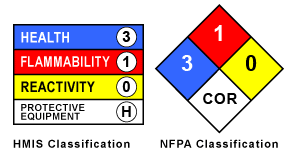What is it?
Aqua ammonia is a solution of ammonia gas and water and has a sharp, irritating odor.
How is it used?
Aqua ammonia is one of CALAMCO's key fertilizer products. It is used as a source of nitrogen, and also has an ingredient in the manufacture of some specialty fertilizers. Anhydrous ammonia is used as a pollution control agent and in commercial cleaning products.
What are the potential hazards?
Aqua ammonia is corrosive to copper, silver, aluminum, zinc and zinc alloys. It reacts with body moisture and burns skin, eye, mouth throat, lung and stomach tissues on contact if inhaled or swallowed.
Although the smell of ammonia is unpleasant and sharp it is generally tolerable up to 25 parts-per-million (ppm). Above this concentration irritation of the eyes, nose and throat may begin. 25ppm is also the OSHA permissible exposure. Above 400ppm skin burns and coughing occur.
Is it flammable or explosive?
Aqua ammonia is not flammable or explosive. However aqua ammonia possesses a degree of danger when exposed to fire or elevated temperatures above 600F it will decompose into hydrogen and nitrogen. Hydrogen is a highly flammable gas. In a confined area hydrogen posses an explosive danger and nitrogen posses an asphyxiation danger.
What are the emergency response procedures?
In the event of a spill of aqua ammonia, local authorities will access the scene. The local fire department will attempt to contain the spilled material and prevent the discharge of additional aqua ammonia. If there is a fire, water will be used to extinguish the blaze. Any spilled aqua ammonia will be diluted with water and mopped up or absorbed with an inert dry material and placed in an appropriate disposal container.
What to do if you are exposed.
Eye Contact:
Check for and remove contact lenses. Immediately flush with running water for al least 30 minutes, keeping the eye lids open. Use warm water if available. Obtain immediate medical attention.
Skin Contact:
Remove contaminate clothing as quickly as possible. Flush exposed skin with large amounts of water for at least 30 minutes. Use warm water if possible. If irritation persists seek medical attention. Dispose of contaminated clothing in a manner that limits further exposure.
Minor Inhalation:
Using appropriate respiratory protection remove the affected individuals from the area of exposure. Allow the person to rest in a well ventilated area, if irritation persists obtain medical attention.
Severe Inhalation:
Using appropriate respiratory protection evacuate the affected individuals to a safe area as soon as possible. Loosen tight clothing around the person’s neck and waist. If breathing is difficult administer oxygen. If the person is not breathing perform artificial respiration and obtain medical attention.
Ingestion:
If the victim is not breathing, begin artificial respiration and continue until the victim is breathing. Do not induce vomiting. Call a physician or poison control center and seek immediate medical attention. If tolerated and the victim is conscious give water to rinse the mouth and throat and dilute the stomach contents.
What to do in the event of a spill.
What to do in the event of a release of vapor.
You may wish to:
Unless you are told by authorities:
When you have been advised of an ALL CLEAR by local authorities, open your house to air it out.
